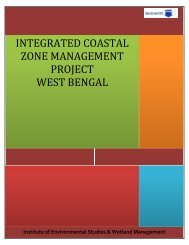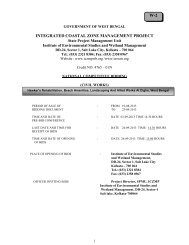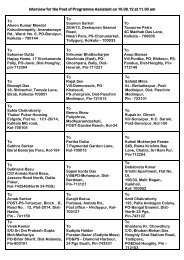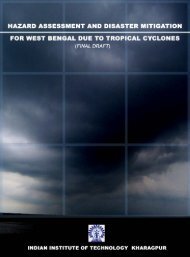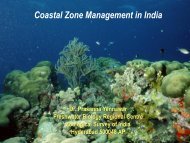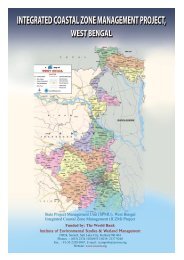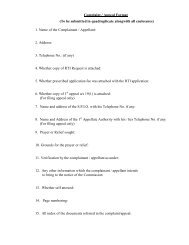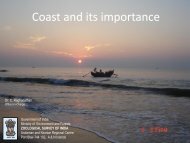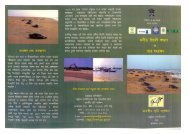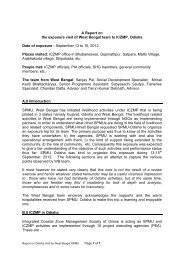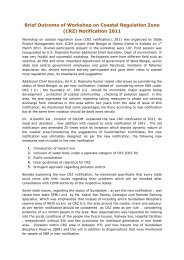INDIA: Integrated Coastal Zone Management Project
INDIA: Integrated Coastal Zone Management Project
INDIA: Integrated Coastal Zone Management Project
Create successful ePaper yourself
Turn your PDF publications into a flip-book with our unique Google optimized e-Paper software.
<strong>INDIA</strong> <strong>Integrated</strong> <strong>Coastal</strong> <strong>Zone</strong> <strong>Management</strong> <strong>Project</strong> (P007985)<br />
place; and in areas of high and medium erosion, projects will be permitted only after cumulative impact<br />
analysis, and not based on project by project environmental impact assessments. The shoreline change<br />
maps for Gujarat, Odisha, Kerala and Pondicherry (about 2210km, or about 44% of mainland coast) had<br />
been prepared, jointly verified with the respective state governments, and publicly disseminated. The<br />
remaining shoreline change maps are under preparation, or verification by the state governments, and are<br />
expected to be completed before December 2011. MOEF, through SICOM, has set up (i) an Expert<br />
Committee to recommend measures to protect highly critical assets on the shore from possible tsunami<br />
events; and the committee is likely to submit their recommendations by July/August 2011; (ii) an Expert<br />
Committee to recommend priority national program for conservation of marine biodiversity. MOEF has<br />
also announced the setting up of the National Centre for Marine Biodiversity in Jamnagar, Guajarat in<br />
partnership with private sector; a Wetland Research Centre at an initial cost of US$ 12 million; and a<br />
Turtle Research Centre – both in Odisha. Initial work on each of these has started. Gujarat has published<br />
detailed mangrove and coral maps; a report on valuation of the corals in Gulf of Kachchh – first such<br />
work in India. All these knowledge products are available in public domain, such as at websites.<br />
12. State level activities to adopt integrated management approaches: In all there <strong>Project</strong> states of<br />
Gujarat, Odisha and West Bengal, there had been very significant communication and consultation with<br />
stakeholders. At village and community level consultation, Gujarat has done very well. In the 173 villages<br />
that the project has started initial activities, each group of stakeholders had been consulted; community<br />
groups formed and provided capacity building support. For organizing this community level consultation,<br />
participation and capacity building activities, the Gujarat SPMU has recruited about 40 specialist staff and<br />
positioned them in the villages. Looking at the success in Gujarat, Odisha SPMU has started replicating<br />
this model; and West Bengal SPMU is discussing appropriate modifications to this model for use.<br />
Together with this local and community level participation and consultation activities, there had been<br />
state level discussions on integrated management approach in all states. The most visible results are at<br />
Odisha, where there had been very high level of involvement of senior policy-makers and officers across<br />
the entire State Government. Both Gujarat and Odisha SPMUs has established a regular system of project<br />
and program review at the highest levels of the State; regular inter-departmental meetings; and joint site<br />
visits. In West Bengal, such activities are yet to be established, even if there are non-regular interactions<br />
among department of the State Government, primarily due to the lack of adequate capacity for project<br />
management. It is important to note that the current activities in Gujarat and Odisha need to be sustained<br />
(and in the case of West Bengal the activities comparable to Gujarat or Odisha need to be implemented<br />
and sustained) to be able to achieve the objective of integrated management.<br />
Likelihood of achieving <strong>Project</strong> Development Objective<br />
13. Implementation of the <strong>Project</strong> has started recently; and very limited data is available for an objective<br />
assessment for the likelihood of achieving the PDOs. The initial progress made, and the current and the<br />
continuing public and stakeholder engagement suggest that the PDOs are likely to be achieved.<br />
14. Replication: As agreed between the World Bank and the GOI at appraisal of the <strong>Project</strong>, replicability<br />
more than sustainability will be the true test of the <strong>Project</strong>. The GOI cabinet Committee on Economic<br />
Affairs has recommended that MOEF should start preparing plans and proposals for replicating the<br />
<strong>Project</strong> in all of the 9 coastal states and 4 coastal union territories. MOEF has started a discussion on this<br />
with all coastal states and union territories. Each State Government and Union Territory Administration<br />
has started internal discussions on this. A national meeting to formally launch preparation of plans and<br />
proposals for replication is expected in CY 2011.<br />
4




